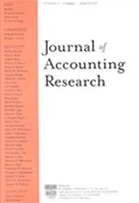 Different journals follow different editorial policies — but we’ve never seen any charge money to authors who want to appeal an editorial decision. Until now.
Different journals follow different editorial policies — but we’ve never seen any charge money to authors who want to appeal an editorial decision. Until now.
Recently, a criminal justice researcher sent us links to multiple journals that charge appeal fees. For instance, the Journal of Accounting Research says authors must pay $500 for each submission — and another $500 if they want the journal to reconsider its decision to reject the paper.
Under “Appeals,” the journal writes:
In response to an increase in submissions and the fact that appeals consume a disproportionate amount of editorial time, we have introduced a formal policy for appeals. The general principle has been and remains that our decisions are final. However, we recognize that there can be circumstances (e.g., fundamental misunderstandings of facts) in which an appeal is justified. In those cases, we ask authors to submit a formal letter stating the reasons for the appeal. The letter should be concise (and not a response document). Considering the resources that appeals consume, we ask for a submission fee of $500. As a first step, the editors will evaluate the appeal correspondence and jointly assess the merits of the case. If we decide that the appeal and the authors’ arguments do not alter our decision, the previous rejection becomes final. If we decide that a reconsideration of the decision is warranted, we will send the paper to the original reviewer(s) as well as to a new reviewer. The new reviewer will advise us solely on the merits of the appeal. Based on the ensuing responses, the editors will make a final decision. No further appeal will then be considered.
Of course, many journals have article submission fees (as well as article processing fees); but the researcher who flagged these appeal fees for us, Justin Pickett at the University at Albany SUNY, told us he thought the policy was “unfair:”
First, it would surely discourage many authors from submitting appeals, even when there is strong basis for appealing a decision. For example, I personally would not pay the fee. Second, it clearly produces a disadvantage for early career scholars who likely will be less able to afford the fee. Third, given the informal way that appeals are often handled–editors spend a few minutes considering the appeal and re-reading the reviews–it is not clear where exactly the money would go. Notice too that for that specific journal, the price to appeal ($500) is identical to the price to submit the article in the first place. But it is hard to believe that the journal staff is going to spend the same amount of time considering the appeal as the original submission.
A spokesperson for Wiley, which publishes the Journal of Accounting Research, told us:
It is common and good practice for journals to have mechanisms in place for authors to appeal editorial decisions, for example when a paper is rejected. Wiley believes that journals should have such processes in place. This particular practice not unique to Wiley journals and as mentioned is common among journals in the finance and accounting fields. The management of the appeals process will always differ between journals and there are a variety of mechanisms available when hearing appeals of which this is one. Wiley will always support our journals in making fair and efficient decisions regarding the appeals process.
Indeed, this isn’t the only journal that seeks money to process appeals. Both The Journal of Finance and The Journal of Financial and Quantitative Analysis charge $500 to consider appeals. Want to appeal the editorial decision by the Journal of Banking & Finance? That’ll be $650 USD. The same thing at The Review of Financial Studies and Review of Asset Pricing Studies will cost $700.
Andrew Karolyi, the editor of The Review of Financial Studies, pointed to the section of the journal’s site that describes history of the appeals process. Between December 12, 2005 and July 11, 2017, 186 groups of authors have appealed the editorial decisions about their papers. Of those, 25 were eventually published.
Pickett said he learned of the financials behind appeals while researching a recent paper he wrote about the appeal process in Criminal Justice journals, published as part of the summer newsletter of the Academy of Criminal Justice Sciences.
Like Retraction Watch? Consider making a tax-deductible contribution to support our growth. You can also follow us on Twitter, like us on Facebook, add us to your RSS reader, sign up on our homepage for an email every time there’s a new post, or subscribe to our daily digest. Click here to review our Comments Policy. For a sneak peek at what we’re working on, click here.
It never occurred to me that one could appeal a journal’s decision not to publish a manuscript. Instead I thought authors typically used the peer review feedback, revised the manuscript, and submitted elsewhere for consideration. I note also that the journals relate to finance and accounting. Are there too few alternative journals in this field to permit “journal shopping?”
When the reason for rejection is bogus, journal shopping is a waste of everyone’s time, and just delays the dissemination of scientific findings. The Committee on Publication Ethics’s (2011) Code of Conduct and Best Practice Guidelines for Journal Editors states that “journals should have a declared mechanism for authors to appeal against editorial decisions.” Journals like The Lancet and BMJ all have appeals processes. A survey of over 1,300 biomedical researchers from high-ranking universities across the world found that more than two-thirds supported providing an appeal system to authors (Ho et al., 2013).
If you are interested, the last few pages of this paper provide a pretty good review of the use of appeals across disciplines:
https://www.researchgate.net/publication/318214617_Methodological_Myths_and_the_Role_of_Appeals_in_Criminal_Justice_Journals_The_Case_of_Response_Rates?).